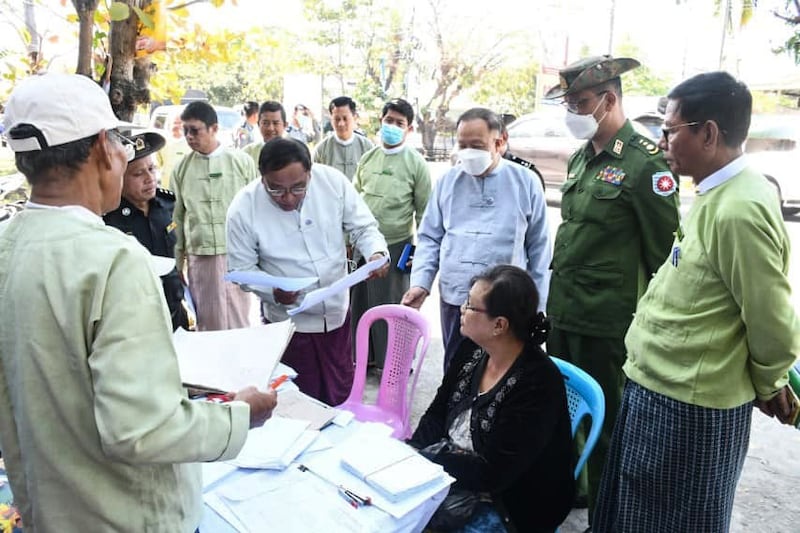Myanmar’s junta claims that it has completed a census that accounts for nearly 90% of the population ahead of planned elections, but critics and political analysts say that’s impossible given the turmoil and fighting wracking the country.
The military regime, which overthrew the democratically-elected government in February 2021, has said it will hold elections this year, but no date has been set. Western governments and international rights groups say that any election held under the junta is unlikely to be free or fair.
Last week, pro-junta media outlets reported that a census comprising 87% of Myanmar’s population of about 54 million people had been collected as part of a pilot program ahead of that vote.
But observers said there was no way that the regime had accurately collected census data for nine out of 10 citizens in the current state of crisis, with an estimated 1.5 million people who have been displaced from their homes.
“[Junta officials] held an emergency meeting last Friday about the elections at the Yangon region government office … [but] they themselves don’t even know what to do in these circumstances,” said an election observer, who declined to be named for security reasons.
“They’ve included names of people who no longer live at their address or have died in their collection of the population census,” he said. “Some of them are in foreign countries ... Frankly speaking, they are struggling to even get 25%.”
According to the Union Election Commission, or UEC, there are currently 63 political parties in Myanmar: 50 that have applied for registration to participate in the elections and 13 that have applied to establish new parties.
Junta chief Senior Gen. Min Aung Hlaing said during a Jan. 23 meeting with the UEC that an election must be held under any circumstances.
Census data ‘completely unreliable’
However, political analyst Than Soe Naing told RFA on Tuesday that since the UEC has been unable to form sub-election commissions in states and regions across the country, it cannot effectively collect the population census or hold an election.
The United Nations estimates that there are around 1.5 million internally displaced persons in Myanmar, many of whom are living in the country’s jungles after fleeing conflict between the military and anti-junta groups in their villages and townships.
“The only place the UEC can collect the population census numbers is from government offices in cities and towns, so their population data is completely unreliable,” he said.
Than Soe Naing also suggested the junta is preparing to hold an election “just for a show,” and pointed out that it has been unable to even announce an exact date.
Tun Aung Kyaw, the spokesman for the ethnic Arakan National Party, went further to suggest that it wouldn’t even be possible to hold an election in Myanmar next year, due to the security and military situation in the country.
He added that parties that applied for recognition under a recently passed political party registration law ahead of a March 28 deadline are required to hand over information about their present status, members and financial accounts within 90 days in order to obtain final legal status.
“That’s why these political parties are not in position to stand firmly,” he said.

Meanwhile, the Union Solidarity and Development Party, or USDP, whose officials are mostly former military generals, is systematically preparing for the junta’s elections, holding frequent party meetings and organizing events around the country.
Attempts by RFA to contact USDP leaders and spokespersons for comment on their preparation for the election went unanswered Tuesday.
Reflecting the people’s will
Regardless of the junta’s success in its efforts to carry out a census and ready the country for a ballot, it must be the people who will determine the political fate of the country, said Bo Bo Oo, a former NLD lawmaker for Yangon region’s Dala township.
“A one-sided election under the control of the military junta will not win any support from the people,” he said. “Any attempt to win the people’s support should be done in ways that reflect the people’s will.”
The NLD won Myanmar’s 2020 general election with more than 80% of the vote, but the military seized power on allegations of vote fraud, which it has yet to present evidence to support. The UEC under the junta also dissolved the NLD in March after its leadership chose not to re-register under the new registration law.
While the junta has yet to announce a date for the election, it has said that national census data will be complete by Oct. 1, 2024.
Political analysts say that the junta intends to use an election to legitimize its rule and secure power in Myanmar for the long term.
Translated by Myo Min Aung. Edited by Joshua Lipes and Malcolm Foster.
